|
|
|
Sort Order |
|
|
|
Items / Page
|
|
|
|
|
|
|
| Srl | Item |
| 1 |
ID:
152722
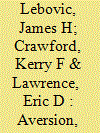

|
|
|
|
|
| Summary/Abstract |
How significant is gender in explaining US public opinion regarding civilian casualties inflicted by the US military during combat and counterterror operations? For answers, we test experimental treatment models on original data obtained from pre-election and post-election surveys conducted as part of the 2014 Cooperative Congressional Election Study. Our evidence supports prior claims that women support military action more reluctantly than men, but, much like men, condition their positions on the accompanying human costs. We find, nonetheless, that women are less likely to support attacks that might bring high numbers of civilian deaths, and, unlike men, base their support on the potential gains from an attack. Indeed, we conclude that differences in support for military action between men and women stem more from the perceived benefits of the attacks than from human costs.
|
|
|
|
|
|
|
|
|
|
|
|
|
|
|
|
| 2 |
ID:
085444


|
|
|
|
|
| Publication |
2009.
|
| Summary/Abstract |
Are violators of international human rights norms punished with lower levels of foreign aid? Despite their abstract preferences, governments often lack the incentive to punish norm violators bilaterally. Multilateral lending institutions, such as the World Bank, could fill the void if they wanted to consider human rights abuses and could bypass restrictions on evaluating the political character of recipients. This article argues that `shaming' in the United Nations Commission on Human Rights, through resolutions that explicitly criticized governments for their human rights records, provided substantive information about rights abuses and gave political cover for the World Bank and other liberal multilateral aid institutions seeking to sanction human rights violators. Statistical analyses support these theoretical claims.
|
|
|
|
|
|
|
|
|
|
|
|
|
|
|
|
| 3 |
ID:
073579
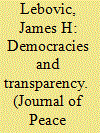

|
|
|
|
|
| Publication |
2006.
|
| Summary/Abstract |
This study assesses participation in the UN Register of Conventional Arms (UNRCA) in its first decade (1992-2001) of operation to determine the effects of democracy on international transparency. First, the function of the UNRCA is discussed. Second, transparency is defined and then explained by democracy and factors recognized in two international politics theories: realism, which emphasizes the effects of state capabilities and interests, and liberal institutionalism, which stresses the facilitative role of international institutions. Third, preliminary judgments are offered based on the frequency and nature of participation in the UNRCA, the consistency between export and import reports to the register, and participation in the register by democracies and non-democracies. Fourth, a cross-sectional time-series logit model is specified and tested to determine the relative effects of democracy on participation in the UN register. The study concludes that existing international politics theories go a long way toward accounting for patterns of openness and deception in international politics but not the full extent that security policies owe to domestic structures and processes.
|
|
|
|
|
|
|
|
|
|
|
|
|
|
|
|
| 4 |
ID:
146187
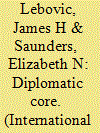

|
|
|
|
|
| Summary/Abstract |
Face-to-face diplomacy is an important feature of international relations. But when and why do high-level diplomatic interactions occur? We examine different theoretical perspectives using a new dataset of diplomatic visits by the US President and Secretary of State. We argue for assessing these visits along two dimensions. First, we posit that the degree of discretion or constraint in the diplomatic calendar falls along a spectrum. Strategic and domestic factors are at opposite extremes while diplomatic routines fall in the middle. Second, we consider the convergence in the relative influence of these sets of factors across the President’s and the Secretary’s calendars. We develop and test hypotheses about the determinants of visits by the President and Secretary of State across twelve presidencies from 1946 to 2010. Overall, the travels of the President and Secretary converge to serve a set of priorities that derive from a fairly stable set of national interests and from diplomatic routine. We observe that the President effectively retraces the footsteps of the Secretary more than the reverse. We find some evidence of domestic (including individual-level) influences on diplomacy, but only limited evidence that times of crisis produce distinct patterns in face-to-face encounters.
|
|
|
|
|
|
|
|
|
|
|
|
|
|
|
|
| 5 |
ID:
138758
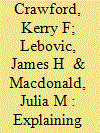

|
|
|
|
|
| Summary/Abstract |
How do we account for the dearth of female contributions to UN peace operations (UNPOs)? For answers, this study examines conditions that led the United Nations to move to reduce the gender imbalance in UNPO personnel and provide these operations. To interpret this evidence, the study presents theoretical explanations for the varying contributions of personnel to NPOs—including the political and socioeconomic character of the contributing states, nternational reputations and norms, and various demand-side influences exerted by missions—and then tests these explanations with a cross-sectional time-series model that accounts for female personnel contributions to each mission in the 2010–2011 period. Although offering significant support for domestic political explanations, the findings indicate that
gender diversity is not a primary goal of most contributors and is largely a by-product of force sizes.
|
|
|
|
|
|
|
|
|
|
|
|
|
|
|
|
| 6 |
ID:
022487


|
|
|
|
|
| Publication |
Aug 2002.
|
| Description |
455-483
|
|
|
|
|
|
|
|
|
|
|
|
|
|
|
|
| 7 |
ID:
092391
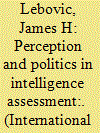

|
|
|
|
|
| Publication |
2009.
|
| Summary/Abstract |
United States estimates of Soviet nuclear goals and capabilities and the current "rogue-state" nuclear threat reflected prevailing beliefs about threat within the U.S. government and the relative influence of agencies charged with threat assessment. This article establishes that the patterns in formal Soviet threat assessment: (i) did not reflect a uniform response to "external threat," (ii) were inevitably tied to underlying assumptions about adversary intent, and (iii) were susceptible then to perceptual, organizational, and/or political influences within government. Thus, threat assessments reflected the optimism and pessimism-and political interests and ideologies-of those who participated in the estimating process. The article concludes by examining these lessons in light of the experiences and challenges of assessing threat from small states harboring nuclear ambitions.
|
|
|
|
|
|
|
|
|
|
|
|
|
|
|
|
| 8 |
ID:
019957
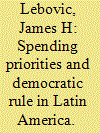

|
|
|
|
|
| Publication |
Aug 2001.
|
| Description |
427-452
|
|
|
|
|
|
|
|
|
|
|
|
|
|
|
|
| 9 |
ID:
058797
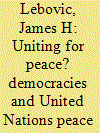

|
|
|
| 10 |
ID:
117571
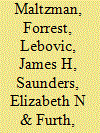

|
|
|
|
|
| Publication |
2012.
|
| Summary/Abstract |
In this article, we use a multimethod approach to shed light on the strategic use of presidential pets. We draw on primary source materials to demonstrate that pets are an important power center in the White House. Then we turn to presidents' strategic use of their pets in public. We present a theoretical framework and statistical evidence to explore the conditions under which presidents are most likely to trot out their four-legged friends. We show that presidents carefully gauge the best and worst times to conduct a dog and pony show. In times of war or scandal, dogs are welcome public companions, but not so in periods of economic hardship.
|
|
|
|
|
|
|
|
|
|
|
|
|
|
|
|
|
|
|
|
|